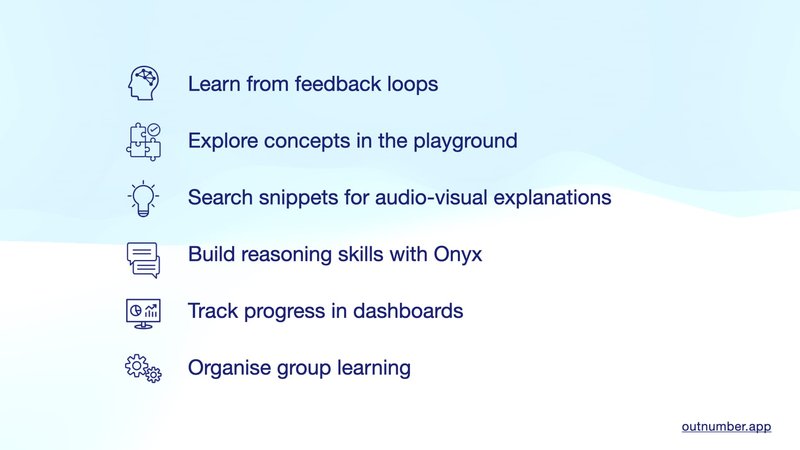Voice: AI-generated, courtesy of Qognitive Lab
Creative entrepreneur, storytelling coach and podcaster Alex Searle delves into the inspiring story behind Outnumber.app, chronicling its humble beginnings, the valuable lessons learned by the team during development and their ambitious plans for the future.
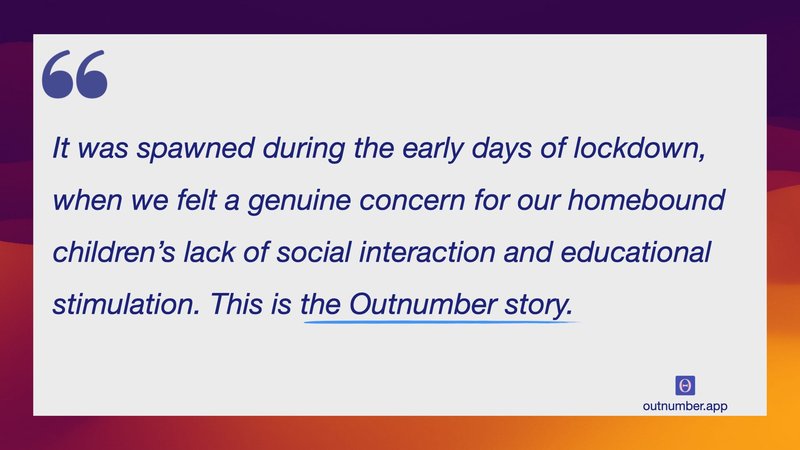
In popular imagination, it’s easy to fantasise that the best breakthrough education apps are conceived in billion-dollar boardrooms and developed by armies of software engineers.
But not Outnumber.
In fact, the entire story of Outnumber’s origin and development is as remarkable as it is unlikely. Like so many modern startup stories, it was spawned during the early days of lockdown, when founder Shawkat Ali felt a genuine concern for his homebound children’s lack of social interaction and educational stimulation.
In particular, their continued progress with mathematics was top of mind.
'I wanted to create an environment where my kids could learn mathematics not just as a subject but as a fun, engaging part of their daily lives.'
Originally a CFA-turned successful entrepreneur and technologist, Ali had already been tinkering with a technology stack for a new online learning platform with a professional development focus. Much of the architecture he’d built was based on breaking up longer course material into short, bite-sized micro-lessons that made digital learning easy and consistent.
‘As the lockdowns began, I searched for suitable maths apps for my children but nothing quite hit the mark. They simply weren’t flexible enough and didn't cater well for complex interactive tasks that improve cognitive abilities, such as matching, sorting or categorising.’
With improvised home-learning having become a reality across the UK for millions of households, neither teachers nor parents were fully prepared for the situation.
‘It seemed to me that digital resources were disparate and challenging for parents to access.’
As with all bold ideas, a new challenge was met with a new opportunity. With schools closed, and limited digital learning alternatives available (not to mention the rife uncertainty and frustration during that time), Ali decided to pivot the development of his nascent learning platform into a solution that could help his two children at home with their maths, aged 5 and 10.
In a matter of weeks, the journey of the Outnumber app had begun in earnest.
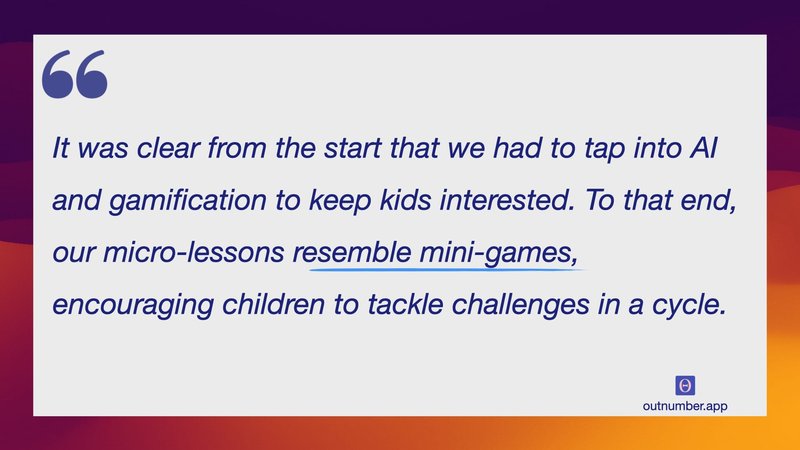
Four years later, Outnumber is not simply a digital maths education tool for primary school-going kids, but has become an interactive resource for developing flexible, non-linear thinking as a core life skill.
In addition, the rich learnings about its design philosophy, AI integration, user adoption and micro-learning strategy has given rise to the new Qognitive platform as the baseline learning experience platform.
This is the Outnumber story, from concept to build, and then to commercial release.
Bootstrapping the journey
Although Ali had plenty of financial services and technology experience, along with university-level mathematics under his belt, developing a new education app from scratch with limited resources was a new and particularly daunting task.
Still, the question of whether to seek traditional funding or bootstrap was clear to him from the outset.
‘It might not have the usual allure for venture capitalists, but for me, Outnumber was a passion project that blended my background in mathematics, technology, and my journey as a parent.’
As a result, the juggling of the various roles and working within a limited budget was all part of making the personal investment worthwhile.
In addition, he also realised that embracing the latest applied learning strategies and technologies was crucial to the Outnumber’s ability to engage and retain the interest of its young users.
‘It was clear from the start that we had to tap into AI and gamification to keep kids interested. To that end, our micro-lessons resemble mini-games, encouraging children to tackle challenges in a cycle, absorbing knowledge through repeated feedback.’
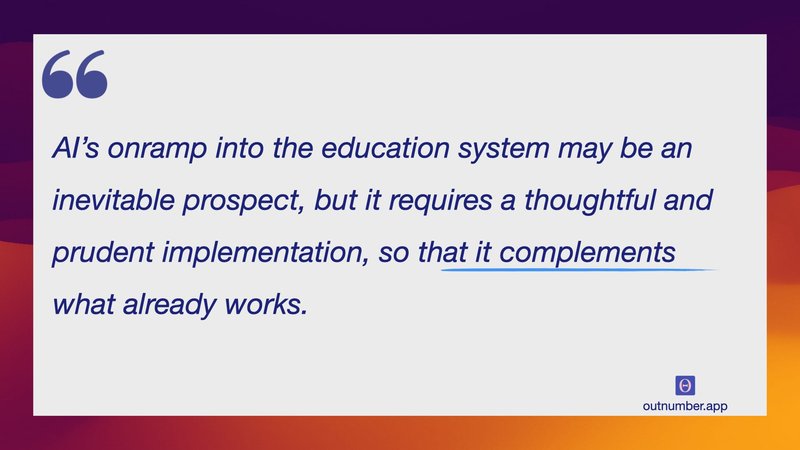
Ali is exceptionally proud of Outnumber’s curriculum, which was modelled on the PISA framework by the OECD, with a strong emphasis on reasoning and problem-solving. Much of the design effort went into incorporating 21st Century skills and the practical application of maths in everyday life.
‘By introducing our young users to context-rich problems early on, we nurture flexible learning and encourage non-linear thinking.’
Mindfully including resources from other leading maths countries like Singapore, Hong Kong, Australia and Canada helped to provide a wide-ranging and well-rounded suite of learning materials. In this way, Outnumber strikes a good balance between providing a 21st Century educational journey while still completing the national curriculum.
Outnumber’s focus on maths as a way to teach and nurture core thinking skills is an unmissable feature that one notices right away from the home screen.
However, from the early stages, it was evident that smart features and a forward-looking curriculum was not going to be enough of a disruptive force. What distinguishes outstanding app-based educational experiences are the dedicated base of contributors behind them, who are equipped with both teaching and publishing accomplishments in equal measure.
Only a few months in, Ali soon realised that recruiting a top-notch team of advisors was critical.
‘It was important that they had a grasp of the publishing process,’ he explains, ‘ensuring that our digital content met the rigorous editing and proofreading standards of traditional textbooks. We also needed to seriously consider a young user's perspective, so our contributors needed hands-on experience in teaching children.’
The talent fusion of technical, design and teaching expertise behind Outnumber helped to birth remarkable interactive features in the learning environment, such as the Playground.
‘It’s a space where children can delve into concepts through simulations or visual demonstrations, like the interactive clock or the fraction wall, which simplifies understanding fractions.’
Another feature, like Snippets, offer bite-sized audiovisual clips that explain maths concepts in mere seconds, ideal for short reminders and reviews.
Introducing Onyx: the fusion of learning & AI
By far and away, Outnumber’s greatest technical feat is Onyx, its in-built AI maths assistant and co-learning space.
‘Initially, the idea of an AI tutor wasn't part of the plan because the technology hadn't quite caught up yet. But with the field evolving at such an astonishing pace, it became a core part of development.’
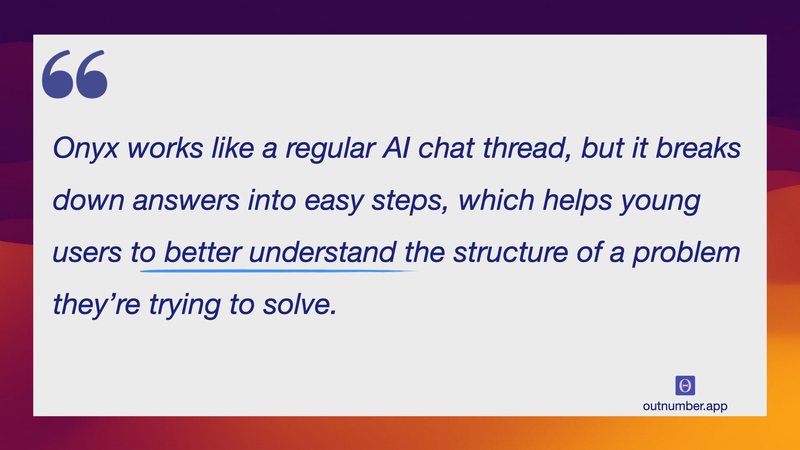
However, back in 2020, the realm of artificial intelligence was less mature and somewhat expensive to develop within. It led to a number of difficult challenges during Outnumber’s development that tested the entire team’s abilities. But they accepted the learning curve and started with implementing AI in incremental ways.
Incorporating a lifelike text-to-speech library brought a highly dynamic element to learning as ‘human’ audio instructions are crucial for children who are still developing their reading skills. Not only has this made lessons more accessible, but it also mimics the experience of having a personal tutor in the room with them.
Generative AI was also integrated into the app and, while it offered great potential, ensuring sensible and effective safety measures was of paramount concern. No one would want their kids on an app that risks exposure to untested or unscripted AI features.
In addition, the challenge of fine-tuning a generative AI model to provide appropriate guidance at each age level was formidable. After many trials and refinements over many months, the solution was to design Onyx as a guiding companion that encourages self-discovery and critical thinking, rather than spitting out ready-made answers.
‘Onyx works like a regular AI chat thread, but it breaks down answers into easy steps, which helps young users to better understand the structure of a problem they’re trying to solve and why a particular solution works. This is enormously useful when they might hit a snag with their homework,’ Ali explains.
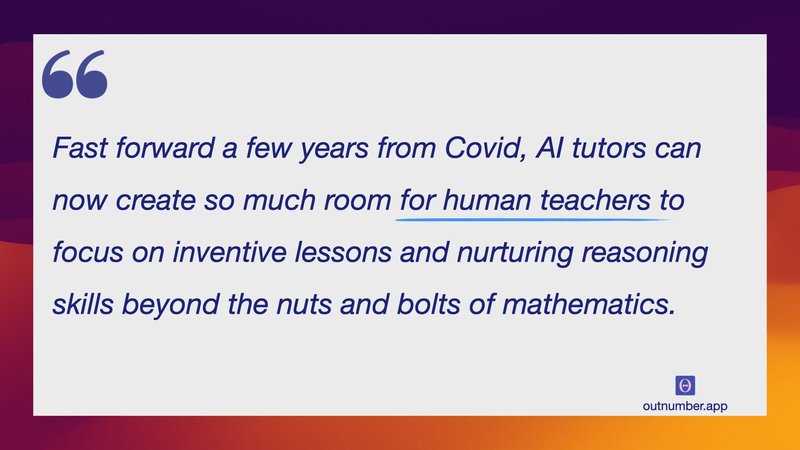
The design of Onyx captures the most outstanding element of the Outnumber app experience, as well as its learning philosophy: it’s all about developing independent learners by teaching them how to ask the right questions. Onyx helps them to refine their reasoning by nudging them to ask more focused questions, discovering the solution step-by-step on their own.
Even in the early stages of rollout, it became apparent that Onyx’s real usefulness appealed to learners from Year 4 upwards in particular, where complex reasoning and problem-solving in steps come into real focus.
‘We’ve found that learners often feel more comfortable with an AI-tutor because there is no judgement or social pressure, unlike in a classroom where fear of embarrassment or criticism from peers can cause shyness,’ he adds.
For Ali, this reinforces his conviction in the app’s use as a complement, rather than replacement for real teachers. At its best, the app offers additional reinforcement and practice of concepts outside of school hours, as well as allow for different levels of competency and interest between students.
Interestingly, this is also the best way to retrain and improve the AI’s own capabilities, by refining, correcting and broadening its ability to respond by helping it pose better questions.
‘Fast forward a few years from Covid, AI tutors can now create so much room for human teachers to focus on inventive lessons and nurturing reasoning skills beyond the nuts and bolts of mathematics,’ says Ali.
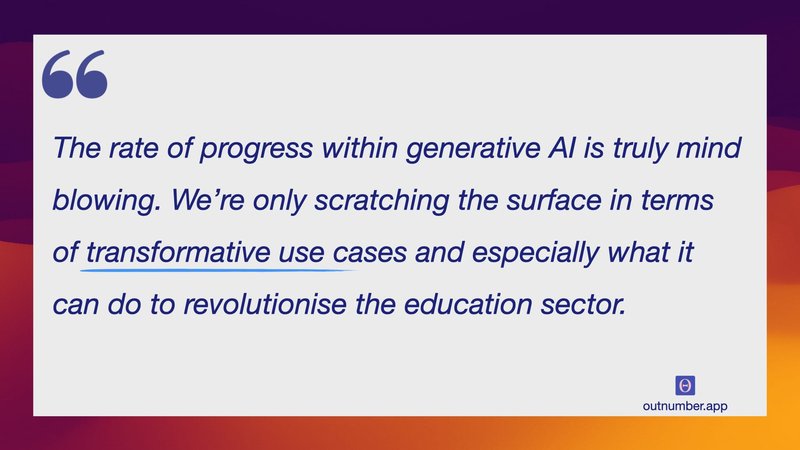
In the years since its original development, Outnumber has moved swiftly beyond AI-assisted co-learning, and has introduced an AI co-pilot for teachers, which was designed to make teachers’ lives easier. It’s like their own personal assistant that can help with many day-to-day tasks of a teacher, such as lesson planning, report writing or even grading.
‘The rate of progress within generative AI is truly mind blowing. We’re only scratching the surface in terms of transformative use cases and especially what it can do to revolutionise the education sector. ’
It’s this experience that has convinced Ali of the view that learning platforms must fully embrace AI or risk immediate obsolescence.
An app for all: Uptake, inclusion & pricing
In the time since its public rollout to a selection of school-going kids across the UK, the Outnumber app’s Playground, Snippets and Onyx features have been extensively integrated into various normal school curricula, being used daily as a digital aid for teachers and a home remedial tool for learners.
‘In particular, we were pleasantly surprised to find that the Playground feature sparked many in-class discussions,’ notes Ali.
Outnumber also enables teachers to use their own content within the app’s learning environment, to help keep their students on top of regular homework schedules and exam prep.
At the same time, Ali and his team were keen on ensuring that maintaining a healthy dynamic around in-class competition and keeping the leaderboard-style features in perspective. This is also reflected in their effort to keep the app inclusive to all learner levels, and not just for wunderkinds.
‘We believe that maths is for everyone. It’s all about encouraging collaborative learning and boosting confidence, no matter which level you’re at. It’s a non-competitive app by nature. The real champion is self-directed learning, which centres on understanding rather than performance.’
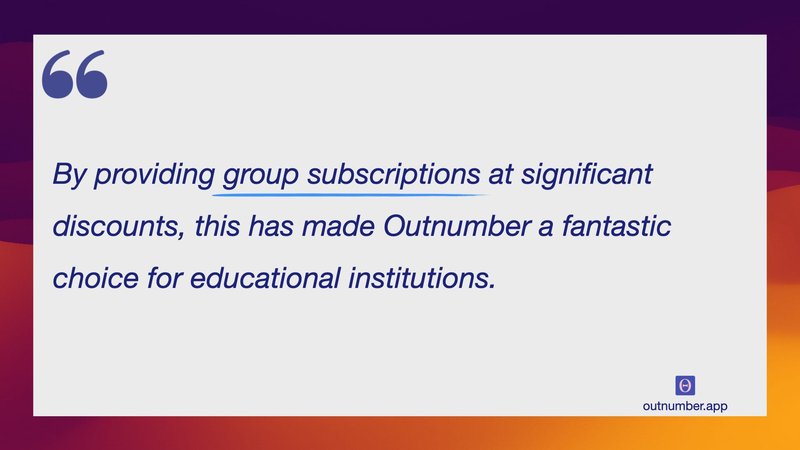
Ali has felt immense gratification that this core design philosophy has been realised by the user experience directly. In addition, when asked about screen time, a reasonable parental concern, Outnumber’s educational design principles are once again balancing crucial engagement without overuse.
‘We’re quite conscious of the screen time dilemma,’ Ali says. ‘The app is designed to deliver short, impactful learning sessions without encouraging prolonged use.’
Ali’s sense of inclusion and awareness around what’s best for young learners is chiefly reflected in Outnumber’s business model.
Unsurprisingly, the app offers enormous value for money. For families, there’s an all-access monthly subscription of £11.99 per month, as well as offering considerable discounts for those opting for quarterly or annual plans.
Given the app’s rich features and proprietary AI tutor, it’s safe to say that Outnumber outperforms within its category.
‘We realised that onboarding schools with as little friction as possible was a core part of the adoption strategy,’ Ali adds. ‘By providing group subscriptions at significant discounts, this has made Outnumber a fantastic choice for educational institutions, not just to help their pupils with their maths but also introduce generative AI in a secure and conscientious way.’
This may end up becoming one of the Outnumber project’s major long-term contributions to pedagogy in the UK and internationally. AI’s onramp into the education system may be an inevitable prospect, but it requires a thoughtful and prudent implementation, so that it complements what already works and positively disrupts what must be improved for the benefit and safety of youngsters.
Still, Ali and his team are highly resistant to praise, and aware of both Outnumber’s power and responsibility.
‘We’re not here to replace teachers at all. It's a partnership. The app helps to boost the teacher's influence, not undermine it. Nothing can match the personal support and motivation that only passionate and dedicated teachers can provide.’
Future prospects
Looking back on the entire project, Ali marvels at Outnumber’s astonishing progress, especially given that it started as a detour from his original aim.
Luckily for the growing team at Ali’s digital advisory and technology venture firm ThamesCatalyst, the Outnumber experience has proved an invaluable, essential crash course.
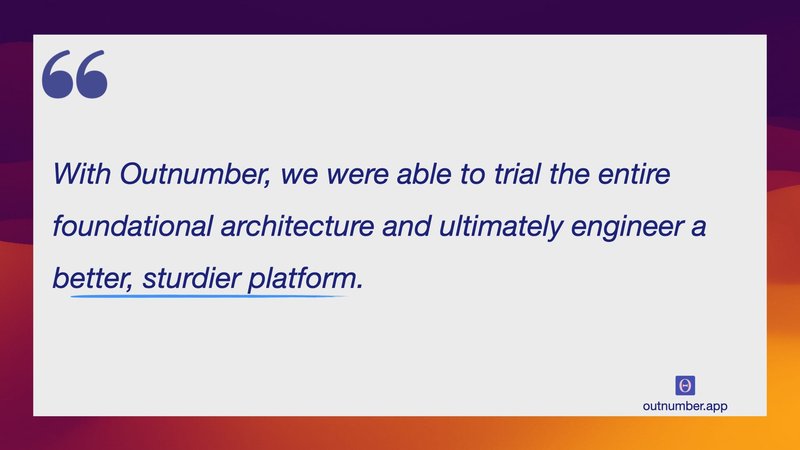
‘I initially wanted to develop a general-purpose learning platform, and now we’re coming full circle. With Outnumber, we were able to trial the entire foundational architecture and ultimately engineer a better, sturdier platform,’ Ali notes.
Introducing Qognitive, an end-to-end SaaS learning platform that engages learners from educational, government and private sectors.
Leveraging the hard-won learnings from the Outnumber project, Qognitive offers an immersive AI-powered experience with a snappy micro-learning structure. The cloud-first learning platform is fast to roll out and boasts the kind of robust security and compliance features that enterprise-level buyers would expect.
‘We’ve learned so much from helping young learners with their maths,’ says Ali, ‘and we’ve found that organisations have very similar needs when it comes to fostering a culture of continuous, lifelong skills development amongst their teams. It’s about cost and complexity, and for Qognitive, those are built-in advantages.’
It is in this way Shawkat Ali and his company ThamesCatalyst continue to reimagine learning for a 21st Century, digital-first world and help organisations harness the power of AI.
You can explore Qognitive here: https://qognitive.app/

Are you supporting primary-age mathematics learners?
Outnumber offers easy-to-follow learning roadmaps, user-friendly progress trackers and interactive microlessons that provide instant feedback, making learning more engaging.
Start free trial